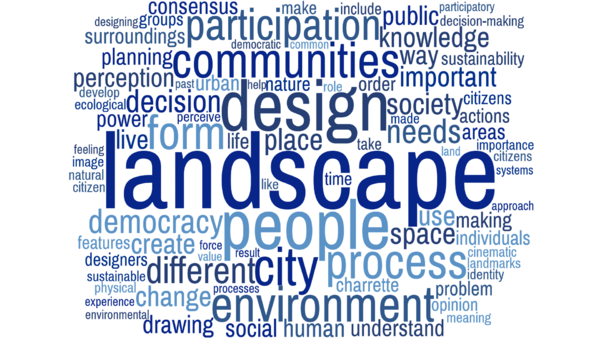Towards the Open Landscape Academy
Every design action is a political act. Whose politics will we style?
--Randy Hester, "Declaration of Interdependence," the Landscape Architecture Foundation
What's the Open Landscape Academy (OLA) and why should you, as a student of design and planning disciplines, be part of it?
Open Landscape Academy is a three part project focusing on democratic landscape transformation, launched in April 2023, including:
- Democratic Landscape Transformation, a semester-long international online educational seminar presented by a team of practitioners from universities and NGOs across Europe and the U.S. with presentations, discussions, and multimedia resources from around the world
- Intensive summer onsite workshops that test what you learned in the seminar
- Local Living Labs at several European sites where ideas, experiences and methods are tested, assessed, re-interpreted, and documented
OLA Charta of Democratic Landscape Transformation
The vision, mission and values of the Open Landscape Academy are comprised in the OLA Charta of Democratic Landscape Transformation. This is a living document we are constantly further developing.
- Download OLA Charta of Democratic Landscape Transformation (Version June 2024)
For more information on the Open Landscape Academy please visit:
What's the Open Landscape Academy's approach?
This is an participatory action research (PAR) project on landscape democracy, which means that our team of instructors are also learning and experimenting in the course of the project. The basic question driving the project is how we co-create a model for democratic landscape transformations -- grounded in theory, practices of landscape democracy and participation. Landscape democracy is an emergent aspect of our profession at the intersection of landscape and human rights. The OLA's biggest goal is to prototype a model that engages academic and local knowledge, professionalism and creativity, giving privilege to the perspectives of the historically underserved communities who have not had access to landscape democracy. We seek to think truly globally and apply local solutions.
What history and values inform OLA?
The OLA model builds on the experiences matured during two previous projects, Landscape Education for Democracy (LED) and its successor, LED2LEAP projects, but is now a more expansive partnership to include all communities of practice involved in promoting systemic change that benefits individuals and ecosystems. The OLA instruction team have a diverse set of many different values that govern the program's methodology and content, with a few of them being:
- Empathy
- Democracy
- Openness
- Participation
- Sustainability
- Resilience
- Collective creativity & co-creation
- Regenerative design
- Visioning
- Connectivity
- Empowerment
- Justice
- Equity
- Respect
What can you expect to learn from OLA?
We as a team have multiple learning objectives for our students and know that due to the experimental, participatory nature of OLA, new and unexpected learning objectives will emerge in the course of the program. The learning objectives are laid out in more detail elsewhere on this Wiki, but here are just a few of the many topics we plan to explore within the overarching theme of landscape democracy:
- Systems thinking
- Power structures
- Democratic process
- Techniques for community engagement and participation
- Right to the landscape
- Transportation justice
- Landscape storytelling
- Environmental justice
- Mapping
ERASMUS+ Programme & Partners
The OLA Project is partially funded by the ERASMUS+ European Union grant program, under grant no.2022-1-DE01-KA220-HED-000085922. Neither the European Commission nor the project's national funding agency is responsible for the content or liable for any losses or damages incurred that are the result of the use of these resources.

